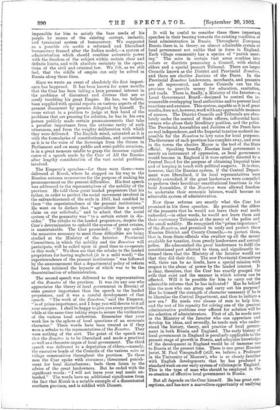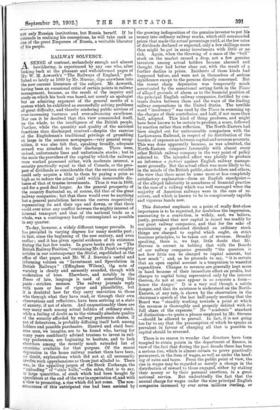THE VOICE OP THE CZAR.
IN ourissue of August 16th last we drew attention to the ominous condition of things in Russia and to the deep and widespread discontent that exists with respect to the system of administration throughout the Empire. We then pointed out the almost insoluble political dilemma by which the Emperor was confronted. On the one hand, it seemed impossible for him to create an Imperial repre- sentative system, and on the other hand, it seemed equally impossible for him to satisfy the bare needs of his people by means of the existing corrupt, inelastic, and tyrannical system of bureaucracy. We suggested as a possible via media a reformed and liberalised bureaucracy framed after the Indian model,—a system of administration which should combine autocratic power with the freedom of the subject within certain clear and definite limits, and with absolute certainty in the opera- tions of the civil and criminal law. We felt, as we still feel, that the riddle of empire can only be solved in Russia along those lines.
Since we wrote an event of absolutely the first import- ance has happened. It has been known for some months that the Czar has been taking a keen personal interest in the problems of discontent and distress that are so sorely troubling his great Empire. He has, we believe, been supplied with special reports on various aspects of the present discontent by persons delegated by himself. To some extent in a position to judge at first hand of the problems that are pressing for solution, he has in his own person publicly made certain pronouncements that take a peculiar importance from the extreme rarity of such utterances, and from the weighty deliberation with which they were delivered. The English mind, saturated as it is with the formularies of constitutionalism, and accustomed as it is to the voice of the Sovereign from the throne in Parliament and on many public and semi-public occasions, is in a great measure unable to grasp the immense signifi- cance of a speech made by the Czar of All the Russias after lengthy consideration of the vast social problems involved.
The Emperor's speeches—for there were three—were delivered at Kursk, where he stopped on his way to the Russian autumn manceuvres for the purpose of making his pronouncement on the present difficulties. His first speech was addressed to the representatives of the nobility of the province. He told those great landed proprietors that his father, in order to perfect the social movement involved in the enfranchisement of the serfs in 1861, had confided to them " the superintendence of the peasant institutions." He went on to declare that " agriculture has a special claim on our solicitude," and to admit that the social system of the peasantry was "to a certain extent in dis- order." The rebuke to the landed proprietors, despite the Czar's determination to uphold the system of great estates, is unmistakable. The Czar proceeded : " By my orders the measures necessary to meet these difficulties are being studied at the Ministry of the Interior. Provincial Committees, in which the nobility and the Zemstvos will participate, will be called upon in good time to co-operate in this work." We thus see that the rebuke to the landed proprietors for having neglected (it is a mild word) " the superintendence of the peasant institutions " was followed by the announcement that a departmental policy of reform had been initiated the keynote of which was to be the decentralisation of administration.
The second speech was delivered to the representatives of the Zemstvo of the province. It was (to any one who appreciates the theory of local government in Russia) of even greater importance than the speech to the landed proprietors, and it was a careful development of that speech. " The work of the Zemstvos," said the Emperor, " is of prime importance, and I hope you will devote to it all your energies. I shall be happy to give you every protection, while at the same time taking steps to secure the unification of the various local authorities. Remember that your work lies in the sphere of local questions of an economic character." These words have been treated as if they were a rebuke to the representatives of the Zemstvo. They were nothing of the sort. The point of the speech was that the Zemstvo is to be liberalised and made a practical as well as a theoretic organ of local government. The third speech was delivered to a deputation of elders,—namely, the executive heads of the Councils of the various mirs or village communities throughout the province. To these men the Czar spoke with sternness ; threatened punish- ment for local disturbances ; bade them listen to the advice of the great landowners. But he ended with the significant words : " I will not leave your real needs un- heeded." The words have an additional significance from the fact that Kursk is a notable example of a discontented southern province, and is riddled with Dissent. It will be useful to consider these three important speeches in their bearing towards the existing condition of local administration in Russia. Throughout European Russia there is, in theory, an almost admirable system of local government not unlike that in force in England. Each village community has a species of " parish meet- ing." The mirs in certain vast areas combine into vo/osts or districts possessing a Council, with elected elders and a special peasant Tribunal. There are larger Councils known as the District and Provincial Zemstvos, and there are elective Justices of the Peace. In the Provincial Zemstvos landowners, merchants, and peasants are all represented, and these Councils can tax the province to provide money for education, sanitation, and roads. There is, finally, a Ministry of the Interior—a Local Government Board—designed to control the in- numerable overlapping local authorities and to prevent local exactions and excesses. This system, capable as it is of great results, does not, however, work with any appreciable measure of success. The District Councils and Tribunals are abso- lutely under the control of State officers, influential land- owners who abuse their hereditary position, and the police. The Provincial Assemblies and Justices of the Peace have no real independence, and the Imperial taxation makes it im- possible for the Zemstvos to levy rates for local purposes. The Governor of each province'has complete sway, and even in the towns the elective Mayor is the tool of the State official. Speaking broadly, Russian local government is merely an instrument of oppression, as local government would become in England if it were entirely directed by a Central Board for the purpose of obtaining Imperial taxes and of keeping in touch with political suspects. It is clear, however, that the Russian system, if the Central Depart- ment were liberalised, if its local representatives were strictly controlled, if the great landowners were compelled to perform their hereditary constitutional functions in the local Assemblies, if the Zemstvos were allowed freedom to undertake their economic labours, would become an admirable system of administration.
Now these reforms are exactly what the Czar has promised in his three speeches. He promised the elders of the peasants that he would not leave their real needs unheeded,—in other words, he would not leave them and their customary Tribunals at the mercy of the police and the small nobility. He recognised the "prime importance" of the Zemstvos, and promised to unify and protect these Russian District and County Councils,—to protect them, that is, from State officials who swallow up all the money available for taxation, from greedy landowners and corrupt police. He admonished the great landowners to fulfil the constitutional part allotted to them, and significantly in- formed them that the Ministry of the Interior would see that they did their duty. The new Provincial Committees will, there can be no doubt, have a special mission with respect to the abuse of power by the landed interest. It is clear, therefore, that the Czar has exactly grasped the evils that exist and the manner in which reform can be effected. Will it be possible for him to carry out the admirable reforms that he has indicated? Has he behind him the men who can grasp and carry out his purpose? Has he himself the strength of character necessary if he is to liberalise the Central Department, and thus to initiate a new era ? He needs two classes of men to help him, and the test of his capacity for solving one of the greatest administrative problems ever offered for solution will be his selection of administrators. First of all, he needs men in the Ministry of the Interior who can appreciate and develop his ideas, and secondly, he needs men who under- stand the history, theory, and practice of local govern- ment in both Russia and England. The early history of local government in England is peculiarly applicable to the present stage of growth in Russia, and adequate knowledge of the development in England would be of immense use to Russia at the present time. There is one great Russian jurist, M. Paul Vinogradoff (still, we believe, a Professor in the University of Moscow), who is so closely familiar with English developments that he has produced a standard work on our early system of villeinage in England This is the type of man who should be employed in the re-creation of effective local government in Russia.
But all depends en the Czar himself. He has great con- ceptions, and has now a marvellous opportunity of unifying not only Russian institutions, but Russia herself. If he Fucceetis in realising his conceptions, he will take rank as one of the great Emperors of Russia, a veritable liberator of his people.








































 Previous page
Previous page